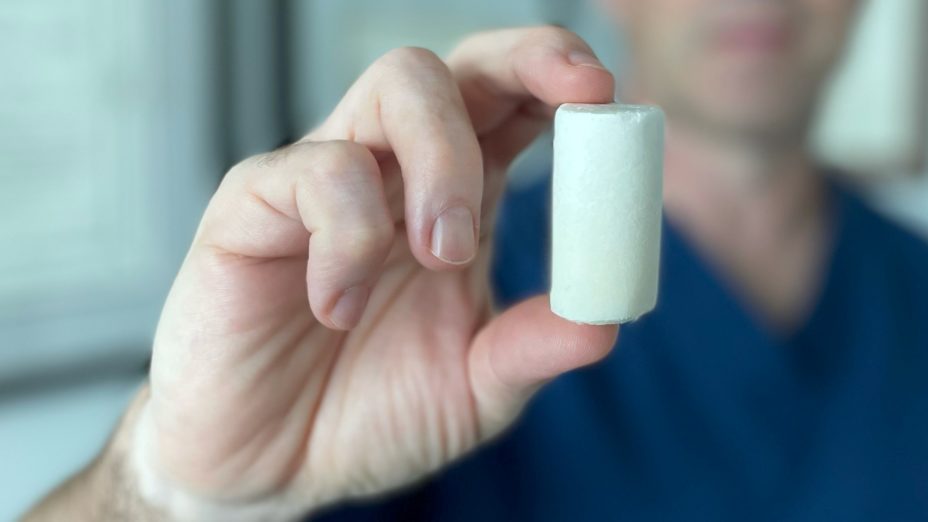Scripps First in Region to Use Novel Implant to Heal Knee Ligament Tears
Patients with tears of their anterior cruciate ligament (ACL) now have a new treatment option that can replace the need for ACL reconstruction surgery, as Scripps Clinic became the first in San Diego County to perform surgery using a new implantable device that enables the body to heal its own torn ligament.
The device – called the Bridge Enhanced ACL Restoration (BEAR) implant – acts as a bridge to help the torn ends of the patient’s ACL heal back together. Surgeons inject the implant with the patient’s own blood and arthroscopically insert the device between the torn ACL segments, through a small surgical incision.
Derived from animal collagen, the implant is designed to stabilize the ACL and encourage healing in the gap between the torn ends of the ligament to allow the formation of a clot, which is necessary to bind the ruptured ends together. The patient’s body absorbs the implant material within a few months, by which time new, healthy tissue has grown in its place.
For many years, the surgical standard of care for a torn ACL has involved complete removal of the damaged ligament, followed by reconstruction with either an autograft (a healthy tendon harvested from another part of the patient’s body) or an allograft (a tendon harvested from a donor). ACL tears are not usually repaired using sutures to sew the ends back together, as this approach has generally been shown to fail over time.
The ACL is a band of tissue that runs diagonally through the center of the knee and plays a key role in keeping the knee stable when twisting or pivoting. Tears to the ACL typically do not heal on their own because the knee joint is surrounded by synovial fluid, which prevents healing. Active patients with complete ACL tears are often encouraged to consider surgery, due to knee instability that can limit sports and activity, as well as lead to future knee cartilage damage. According to the American Academy of Orthopaedic Surgeons, nearly 200,000 ACL reconstruction surgeries are performed in the United States each year.
“Torn ACLs are among the most common knee injuries we see, so it’s exciting to offer a new approach that can fundamentally change the way we treat them,” said Tim Wang, M.D., who was the first Scripps Clinic orthopedic surgeon to perform the minimally invasive BEAR procedure at the new advanced ambulatory surgery center at Scripps Medical Center, Jefferson in Oceanside. “Benefits to this approach include being less invasive than traditional ACL reconstruction surgery, which can lead to faster recovery of muscle strength.
“Most importantly, it does not require a second surgical site to harvest a healthy replacement tendon, or the use of a donor tendon,” Dr. Wang said. “The BEAR procedure can preserve more of the patient’s natural knee anatomy.”
The BEAR implant is indicated for skeletally mature patients at least 14 years of age, with a complete rupture of the ACL. Patients must have an ACL stump attached to the tibia to allow for the restoration and the device must be implanted within 50 days of injury. The Food and Drug Administration cleared the device for use in patients in December 2020. It is the only implant cleared by the FDA for ACL restoration.
Jenna Richardson of Oceanside was the first patient to undergo the BEAR ACL procedure in San Diego County. The medical sales representative stays active with surfing, skiing and other sports. So after she suffered a complete tear of her ACL while mountain biking over the summer, she searched for a treatment that could help her return to the activities she loves.
“I’ve always been interested in cutting-edge technology, so when I tore my ACL I did a lot of research into the latest options that are now available,” Richardson said. “I was happy to learn Dr. Wang was starting to offer the BEAR technique close to home. I plan to enjoy my favorite sports for many years to come, so I like the idea of being able to heal my own anatomy and not having to take a graft from one of my other tendons.”
Nationwide, there are currently fewer than 100 surgeons in 26 states performing the BEAR procedure. More information about the new procedure is available by calling 1-800-SCRIPPS (1-800-727-4777).

Category: Other







